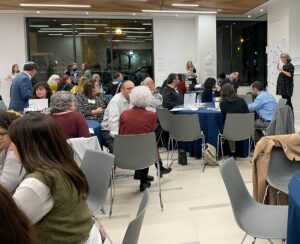Why Convenings Are Part of Our Strategy to Scale
April 24th, 2023
In the past few months, I have been fortunate to attend two “inaugural” convenings of Jewish professionals who previously had not been together in person as a cohesive group. Each event was curated for individuals who play a particular role in different organizations within Jewish education. The power of convening professionals in person, with similar roles across organizations, was especially pronounced in a world heavily impacted by the pandemic. There was a unique energy and excitement created by those face-to-face interactions, with the opportunity to discuss common goals and innovative solutions for shared challenges.
Convenings of this nature are more than just learning opportunities for the participants; they are valuable learning experiences for the Jim Joseph Foundation too. We get to hear, in real-time, how professionals approach their work, what they’re grappling with, and what they need to further advance the field. Convenings also are part of our strategy to scale best practices—whether in data gathering and usage, design of professional development programs, Jewish learning experiences, or other models—from one organization or community to others in the field.
One convening, sponsored by the Collaborative for Applied Studies in Jewish Education (CASJE), invited directors of professional development (PD) programs for Jewish educators writ large to learn about applying research to practice. Thirty organizations were represented that provide high-quality PD for a wide variety of educators using different teaching formats and in various settings—day school teachers, experiential educators, Hillel professionals, camp counselors, and many more.
Similar to our professional learning community in our Professional Development Initiative five years ago (convened by Rosov Consulting), the 60 program directors at this convening saw themselves as individuals within a professional field—not in silos focusing only on their particular audience or setting. With this mindset, their learning and knowledge sharing covered more topics and focused on more audiences. And any successes each person has is much more likely to impact one of their peers. The group of participants spent two days hearing about research findings (studies both inside the Jewish education arena and outside), asking questions to gain clarity and understanding, breaking into small groups—sometimes with peers they collaborated with previously and sometimes with peers they never thought to consult—and brainstorming how to apply their new learning to improve their programs.
the 60 program directors at this convening saw themselves as individuals within a professional field—not in silos focusing only on their particular audience or setting. With this mindset, their learning and knowledge sharing covered more topics and focused on more audiences. And any successes each person has is much more likely to impact one of their peers. The group of participants spent two days hearing about research findings (studies both inside the Jewish education arena and outside), asking questions to gain clarity and understanding, breaking into small groups—sometimes with peers they collaborated with previously and sometimes with peers they never thought to consult—and brainstorming how to apply their new learning to improve their programs.
The second convening involved “the data people” at five large organizations who provide powerful Jewish learning experiences for young people. The goal was to explore shared measures of outcomes and of participant demographics. Of particular note is that not only had these individuals never before convened, but many of their positions within their organizations are relatively new. This reflects a field of Jewish engagement and education that more and more is recognizing the power of data—and ensuring that they have in-house expertise to help gather it and make data-informed decisions.
Rosov Consulting facilitated a productive conversation about the implementation of a pilot study of shared outcome and participant demographic measures, the resulting findings, the challenges, and the potential for future data collection. Together, the group generated opportunities that will leverage data sharing and discussed issues that might prevent data sharing in certain instances. Some conversations centered around learning from each other (for example, how to collect attendance data, what databases are most conducive to storing data) to sharing challenges related to hiring early career professionals who are data savvy.
Consistent data gathering, analysis, and application of research is in relatively nascent stages across much of our field. These convenings, and future ones like it, will help the field advance in this area, become more sophisticated in data collection and analysis, and scale the use of resulting data more quickly across the field.
While many already knew or knew of each other, the post-pandemic meetings were rich with content, ideas, networking, and celebration. In both, new relationships were formed and past relationships were strengthened, enabling a sense of community and commonality to be regained. These factors make it more likely that proven models of professional development and data gathering are shared and adapted throughout our field. We recognize too that while one convening is productive, its especially impactful to bring these people back together for more convenings, while also introducing new individuals into these experiences. This approach will help to bring fresh perspectives to the table so that more people in Jewish education and engagement can share learnings and work through challenges together.
Stacie Cherner is Director of Learning and Evaluation at the Jim Joseph Foundation.